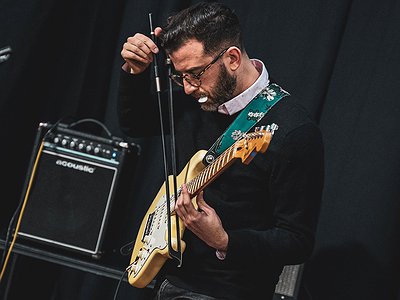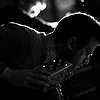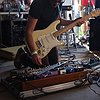As creative goals and technical abilities change, so does the need for different tools of expression, be it instruments, software tools or recording equipment. Can you describe this path for you, starting from your first studio/first instrument? What motivated some of the choices you made in terms of instruments/tools/equipment over the years?
I am primarily a guitarist, but I’ve been asking myself what that means for a very long time. I am especially interested in the first part of this question, about the ways that creative goals specifically give rise to technical needs of various kinds. I have found that one of the reasons I am not a very prolific composer is that every time I come up with a new project I want to pursue, it seems to involve either developing an entirely new skillset, or acquiring very specific tools for the job, or both.
A good example here is my 2016 record “Our Severed Sleep,” which has a piece on it called “William’s Song.” It's one of the things I’m most proud of and remains a meaningful work for a lot of reasons. (And I talk about this more in the next answer). Part of the composition process involved work on the guitar (also described in the next answer), but working on percussion was the other major component. To really bring the vision I had to life, with the help of Ryan Packard, I ended up having to acquire a pretty substantial transducer, one of the ones that people use to make their cars rattle, and a huge number of jingle bells. I couldn’t order the bells in bulk quickly enough, so we ended up buying a lot of other percussion instruments and removing all the bells.
I think this example speaks to the question of how this path works, but at the same time it’s something of a dialogue: a piece of equipment, even a new instrument (a different guitar, for example) can provoke all kinds of new ideas. Learning new skills or practicing something can give rise to all kinds of new ideas, conversely. So, both encountering new objects and technologies and pieces of equipment out in the world have inspired me to try new things musically, but encountering new techniques or simply new ideas in general have inspired me to pursue learning new things—whether on the guitar, with the computer, or with other electronics—which then bring about new compositional ideas.
Have there been technologies or instruments which have profoundly changed or even questioned the way you make music?
I often find the most ordinary and almost obvious things the most exciting. By this I mean that the clearest and most important examples of how a new technology or instrument can impact one’s entire practice can be almost too basic to notice, unless we pause and direct our attention directly at them. For me, guitar pedals are a clear example. In the past 10 years or so, part of my practice shifted heavily to exploring pedals—understood explicitly as instruments, not “ornamentation” or “effects”—and the ways that even a small or subtle new sound can inspire all kinds of things.
“William’s Song,” the piece of music I mentioned above, specifically came about because I was looking for a new fuzz pedal, something that was not gated and has a lot of sustain. I went to Chicago Music Exchange thinking I’d try a Devi Ever Hyperion II, but the clerk suggested I try out this Wren and Cuff Violet World, which is a Ram’s Head Big Muff clone. I took the thing home and just kind of mesmerized myself with feedback and sustain the next week. The sound of the pedal, especially the sustain, inspired me to go back to the physical guitar and ask it: what other things can you do that will bring out what this pedal can do? A lot of new techniques came out of that, including things like removing the backplate on a Strat and using the back springs for the tremolo percussively—violently strumming them through two amps with a heavily sustained fuzz. I once got a very bad review of this record, which stated “this is just a bunch of feedback through some filters,” which is also a completely accurate description from my perspective—though, I take that to be a description of something really interesting, where this reviewer did not.
All this is to say that it’s not necessarily an obviously “new” or “exciting” piece of technology that will lead to creating something new and exciting, but something relatively normal that turns out to be the right tool for the project that you may not even know you’re working on yet. Another example of this would be simply getting a new guitar. There may be nothing profoundly different from one instrument to the next, they’re both “guitars,” after all. But any musician will tell you, the process of “making friends” with the instrument can be a revelation.
Conversely, there have been times where I’ve met new devices, electronics especially, that have sent me into a really productive creative space. Years ago, before 4ms started producing modular gear, they made amazing guitar pedals. I acquired a Noise Swash from them at least a decade ago, and that device especially provided enormous amounts of inspiration.
The piece called “The Sacrifice of the Voidship Heart of Hearts” was inspired by the Noise Swash, and it is technically the only instrument on the track—no guitars or synths, just this device and some filters.
Collaborations can take on many forms. What role do they play in your approach and what are your preferred ways of engaging with other creatives through, for example, file sharing, jamming or just talking about ideas?
I consider myself an improvisor first and foremost, especially as I’m much less comfortable doing the kind of elaborate planning I end up doing sometimes for more composed pieces. Because of this general orientation from improvisation, collaboration is a fundamental part of everything I do. This is so much so that even the “compositions” I’ve done are often structured improvisations.
I think like many other musicians, the greatest inspiration, the most interesting moments, come from playing with others. There’s this kind of fun and exciting version of the problem of other minds, to put it crudely. On the one hand, you just don’t know exactly what someone is going to do, but when the communication happens just right during improvisation, there is both a feeling of absolute surprise and a profound familiarity, a sense of depth, comfort, and recognition, all in one. That feeling can be elusive, but there is nothing like it, and so it is worth pursuing over and over again.
This speaks to another aspect of improvisation as a practice, its collaborative nature as a kind of culture, not just within a session. Having grown up playing in more straightforward rock bands, especially coming out of a more punk and hardcore community in my late teens and early twenties, the people you played with were the people in your band. Some people had many bands, but generally that was the format. As I got older and sought out communities that focused more on improvisation, one of the great thrills and pleasures came to be the knowledge that you can play with so many more people—so many more possible collaborations, even just for one day or one show.
Since the improvised and experimental communities around the US and the world are both smaller and somewhat far-flung, this has made for some really exciting opportunities. Many of us are friends online, though booking, or just knowing each other’s work. A lot of people in this world will meet for the first time and make a record and play a show together. I have had a few releases like this: in 2019 I visited Los Angeles and asked Patrick Shiroishi and Ted Byrnes, two musicians I really love, to make a record with me. I had never met either of them before. On some very, very deep level, the first notes of Track 5 from our record “Long Day” are the first “words” Patrick and I ever really spoke to each other.
[Read our Patrick Shiroishi interview]
In that same vein, another rewarding aspect of making improvised music is the ability t to inaugurate a conversation with someone, or a group of people, and continuing that conservation for years. An example of this for me is my work with Mark Shippy and Ben Billington. Our first show together, at Elastic Arts in Chicago around 2015, felt like a rocket taking off. We then made a record together, and a second, and played shows that felt like we could leave the planet, and others where we genuinely looked at ourselves and thought “what are we even trying to do here?” The longest conversation of this kind, in my life, has been with my best friend Michael Nicosia. We have been playing together since we were teenagers, and even if we don’t do anything for 6 months, we can pick up like nothing’s happened and record an hour of music we are proud of without a rehearsal or conversation.
In all cases, whether something improvised or more composed, one of the most fun aspects of making this kind of music is getting to pick who to work with. Having a sense of who is doing what out there, how much you can relate to that person’s voice or style, and taking the chance of asking them to work with you, trusting what you hear before you even begin, is really special.
Take us through a day in your life, from a possible morning routine through to your work, please. Do you have a fixed schedule? How do music and other aspects of your life feed back into each other - do you separate them or instead try to make them blend seamlessly?
I am a college professor currently, which takes up so much of my time (reading, course prep, grading, etc.) that it can feel like I have no time for music. I often go days without practicing or even just futzing around. So, I have a fixed schedule, but one that is so fixed it leaves me very little time for much outside of work right now. At the same time, I am constantly listening to music—at this point, almost always the music of friends—and taking in new things, being inspired, etc. I have often found also that because I do so much reading, and I’m constantly encountering new and very challenging ideas, this process of reading and trying to understand inspires musical ideas constantly.
A piece called “The Work of Light,” which I performed in Chicago at the Museum of Contemporary Art in 2017, was inspired by a line from a work of Emmanuel Levinas, from a book on Levinas that I had translated the previous year. It’s very difficult, at the same time, to say how an idea ends up as a sound. The links between the two are different for everyone. In this way, music and my other work can’t help but shape one another. It would never occur to me to separate them, it feels like that would deprive either area from a huge reservoir of creative energy.
Can you talk about a breakthrough work, event or performance in your career? Why does it feel special to you? When, why and how did you start working on it, what were some of the motivations and ideas behind it?
I had mentioned the piece “William’s Song” above. The idea came about just as many ideas do, but Ryan Packard and I had the chance to perform it, through some rather circuitous twists and turns that I still don’t really understand, in March of 2015 at a New Music festival at Constellation, a great venue in Chicago. In part because the piece was so loud and full of energy, in part because of all the extended techniques I was excited to work out, and in part because the whole show felt like a kind of affront (very loud music in an otherwise quiet program, etc.), it was already thrilling. It also happened that the evening was sold out, a huge number of friends from the Chicago community were there, and the fact that both Ryan and I we felt like we had knocked the piece out of the park, sweating profusely by the end of it, I think that may have been the best show of my life.
That experience was so powerful in part because we felt like we had perfectly executed something we had meticulously prepared for. However, the following year, the debut show of the improvised free trio with Mark Shippy and Ben Billington, felt life-changing for just the opposite reason. This was a completely improvised set, a conversation that felt like we were on the edge of a cliff and could fall off at any moment, and yet one that just “worked.” We and the audience all seemed to know it was “working,” though aside from the volume and energy, it would probably be difficult to say just why.
There is something about a memorable show, or work, that will always remain ineffable. And in turn, that ineffability means that these kinds of events are things we can always return to, reinterpret, re-think, and try to understand. Those nights never die.
Interviews / About
Fifteen Questions Interview with Daniel Wyche
Communal Practices
Part 2

"There is something about a memorable show, or work, that will always remain ineffable. And in turn, that ineffability means that these kinds of events are things we can always return to, reinterpret, re-think, and try to understand. Those nights never die."




